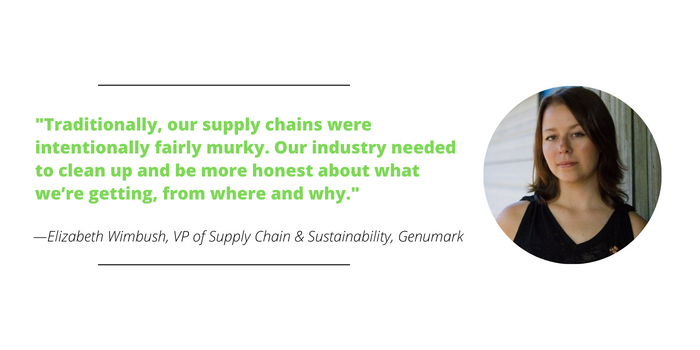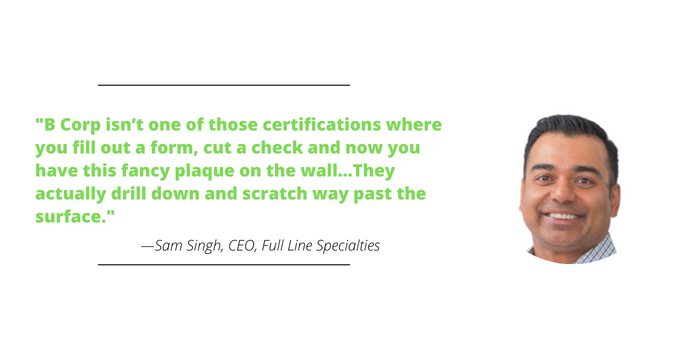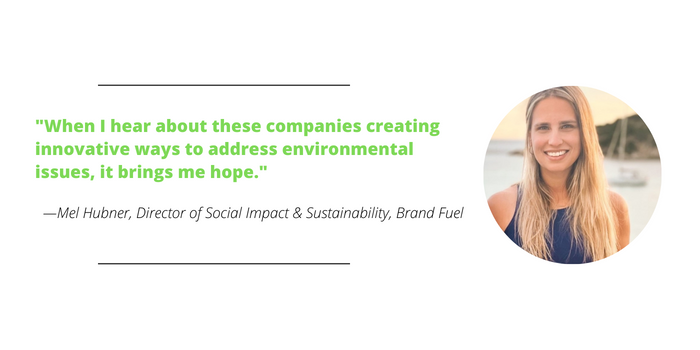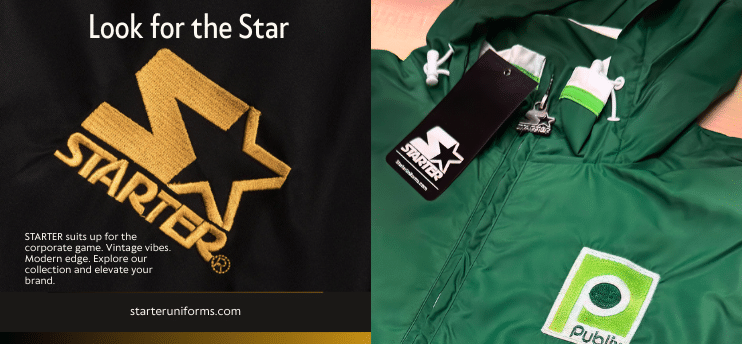As the promotional products industry tries to erase its “brandfill” reputation, an increasing number of suppliers and distributors are prioritizing sustainability.
It’s been a long time coming, according to Elizabeth Wimbush, vice president of supply chain and sustainability at Toronto-based Genumark (PPAI 261066, D11).
“Historically, the promotional products industry has suffered from greenwashing,” says Wimbush, referring to the act of deceiving the public about the environmental benefits of a product or practice. In 2022, 68% of C-suite executives in the United States admitted that their companies were guilty of greenwashing, according to a Harris Poll for Google Cloud.
“There was a lack of transparency around sustainability initiatives and fair labor practices in the promotional products industry,” Wimbush says. “Traditionally, our supply chains were intentionally fairly murky. Our industry needed to clean up and be more honest about what we’re getting, from where and why. We also needed to have these conversations with our suppliers and their suppliers to make sure everything is properly vetted.”
What Is B Corp Certification?
Many promotional products firms are demonstrating their commitment to environmental and social impact by earning B Corp certification, arguably the gold standard in sustainability.
Rather than measuring environmental impact alone, the designation signifies that a company is meeting “high standards” of accountability, transparency and verified performance in a variety of factors, such as supply chain practices, charity work and employee benefits. The holistic approach is what appeals to companies like Genumark, which officially became a Certified B Corporation in May.
 “It’s very easy to understand where a company aligns itself when you see the B Corp logo on its website or products,” Wimbush says. “We’ve been getting a lot more attention from clients we haven’t worked with before. And, from a recruiting standpoint, it’s something that has already positively impacted us. People in younger age groups want to work for a company with strong values that align with their values.”
“It’s very easy to understand where a company aligns itself when you see the B Corp logo on its website or products,” Wimbush says. “We’ve been getting a lot more attention from clients we haven’t worked with before. And, from a recruiting standpoint, it’s something that has already positively impacted us. People in younger age groups want to work for a company with strong values that align with their values.”
As of July 2023, there are nearly 7,000 B Corporations across 91 countries, according to certification founder B Lab, a nonprofit dedicated to helping companies balance profit with purpose.
- Some of the most high-profile B Corps include Patagonia, Ben & Jerry’s and Eileen Fisher.
The movement is growing within the promo industry, too, as Raining Rose (PPAI 232508, S7), Chameleon Like (PPAI 209189, S6), McCabe Promotional (PPAI 100575, D2), Eco Promotional Products (PPAI 793834, D2) and many more firms have earned B Corp certification.
“There’s no doubt that we’ve had a lot of new clients because we’re a B Corp,” says Mel Hubner, director of social impact and sustainability at Raleigh, North Carolina-based Brand Fuel (PPAI 277900, D8). “They’re also mission-aligned clients, which is what we want more of. Because we’re B Corp certified, you can trust that we’re taking our social and environmental impact seriously.”
Trust The Process
Established in 2006, B Corp certification has become so highly regarded because of its onerous and time-consuming process. For example, Brand Fuel began the process more than a decade ago, finally earning certification in September 2022.
The process consists of three steps:
- Achieving a B Impact Assessment score of 80 or above and passing the risk review.
- Making a legal commitment by changing corporate governance structure to be accountable to all stakeholders rather than just shareholders, as well as achieving benefit corporation status if available in your jurisdiction.
- Exhibiting transparency by allowing information about performance measured against B Lab’s standards to be publicly available on your B Corp profile on B Lab’s website.
The first step is the most difficult because the B Impact Assessment tool measures your company’s practices and outputs across five categories: governance, workers, community, the environment and customers. Applicants are not only grilled with a series of questions based on each category, but also must provide documentation to verify their answers. A full-time job in and of itself, the process is best carried out by teams consisting of employees from different departments.
 Here are some sample questions:
Here are some sample questions:
- What percentage of management is from underrepresented populations?
- What portion of your management is evaluated in writing on their performance with regard to corporate, social and environmental targets?
- Does your company monitor and record its universal waste production?
- How do you verify that your product improves the impact of your client organizations?
After an analyst reviews the initial answers, it’s time for follow-up questions and requests for more data. The lengthy, back-and-forth process requires applicants to perform their due diligence regarding every aspect of their operation. “It gets into pretty nitty-gritty detail,” Wimbush says. “Because promotional products companies work with such a wide range of different customers and suppliers, it’s a lot of data collection.”
Sam Singh, CEO of Full Line Specialties (PPAI 241269, D3) in Surrey, British Columbia, summed it up as a “rigorous 18-month journey,” which his second-generation, minority-owned firm completed at the dawn of 2022.
“B Corp isn’t one of those certifications where you fill out a form, cut a check and now you have this fancy plaque on the wall,” Singh says. “They actually drill down and scratch way past the surface, looking at your energy bills and making sure you have proper documentation for everything.”
A Never-Ending Journey
While attaining B Corp certification is certainly cause for celebration, it doesn’t mean you can rest on your laurels. Recertification comes every three years, as well as after a change in company ownership or an initial public offering (IPO). And it’s no walk in the park.
“What we’ve learned through discussion with other B Corps in and out of the industry is that getting certified isn’t the hard part,” Singh says. “Renewal is because you have to go through almost the entire process again. They want to see that you really followed through on commitments that you made, like did you really reduce your carbon footprint over the past 36 months?”
Wimbush says Genumark will start preparing for recertification in a year and a half, but by then, the entire process will look different.
- Based on research and stakeholder input, B Lab has updated its standards for certification six times over the past 17 years, Sustainable Brands reported.
- In December 2020, B Lab announced another review of its standards to not only adapt and advance performance requirements for a post-COVID world, but also better align with other global standards, such as the United Nation’s 17 Sustainable Development Goals.
“You go through all this work, and think ‘okay, we did it,’ but now the fun really starts,” Wimbush says. “Now we get into the nitty gritty of how we’re going to steer this company with this roadmap of how we want to grow sustainably, equitably and as a force for good.”
The best way to do that, Wimbush says, is to continuously learn about sustainability. “From a practical standpoint, some of that is looking at measuring our carbon footprint and getting a baseline so we can have reduction plans moving forward. We’ll also step back and look at how we vet and onboard suppliers, reassessing any relationships we have with suppliers who we’re having a hard time getting compliance data from.”
As far as staffing is concerned, Wimbush vows to “make sure we have education and resources for all of our employees to feel professionally fulfilled and that they’re getting all the tools they need to feel good about their contributions at work and to the world at large.”
For more information on the latest sustainability trends and issues as it pertains to the promotional products industry, register now for the PPAI Product Responsibility Summit running Oct. 8-11 in Alexandria, Virginia.
B Corp Controversy
In recent years, B Lab has come under fire for allegedly lowering its standards to make it easier for large corporations to earn certification. For example, more than 30 certified B Corporations signed an open letter last year protesting Nespresso’s certification, claiming that the Nestlé subsidiary was greenwashing.
“We have not lowered our standards in order for large companies to certify, and we don’t have any intention to do so,” B Lab Global’s Lead Executive Eleanor Allen responded in an open letter.
“B Lab’s standards are continually evolving to include more rigorous performance requirements, which are applied to all B Corps – regardless of size, geography or industry. In fact, larger companies generally have to answer more (and more difficult) questions in the B Impact Assessment and meet higher requirements for verification, transparency and additional factors in order to certify.”
 In May, B Lab released its Preliminary Consultation Summary Report, which indicated that 86% of B Corp respondents and 87% of non-B Corp respondents think the new draft standards represent high standards for social and environmental performance and will help make meaningful progress on pressing social and environmental issues.
In May, B Lab released its Preliminary Consultation Summary Report, which indicated that 86% of B Corp respondents and 87% of non-B Corp respondents think the new draft standards represent high standards for social and environmental performance and will help make meaningful progress on pressing social and environmental issues.
- A second public consultation is scheduled for later this year, and B Lab plans to begin testing the new standards in 2024, Sustainable Brands reported.
“When I hear about these companies creating innovative ways to address environmental issues, it brings me hope,” Hubner says. “We’re all having to change the way we think about how we create products and serve consumer needs. The field of sustainability is evolving so much, and while that’s great, it does cause confusion and challenges. It’s hard, but we’re moving in the right direction.”
Of course, as Singh points out, you don’t have to be B Corp certified to conduct business in a way that benefits the world. “It’s just the right thing to do,” Singh says.
“I strongly believe the companies that will grow and excel in the future are the ones that aren’t just profitable. It has to be profit with a purpose. The industry, our customers and Planet Earth have been good to us. Why can’t we nurture and give back to the things helping us achieve our dreams and goals?”


